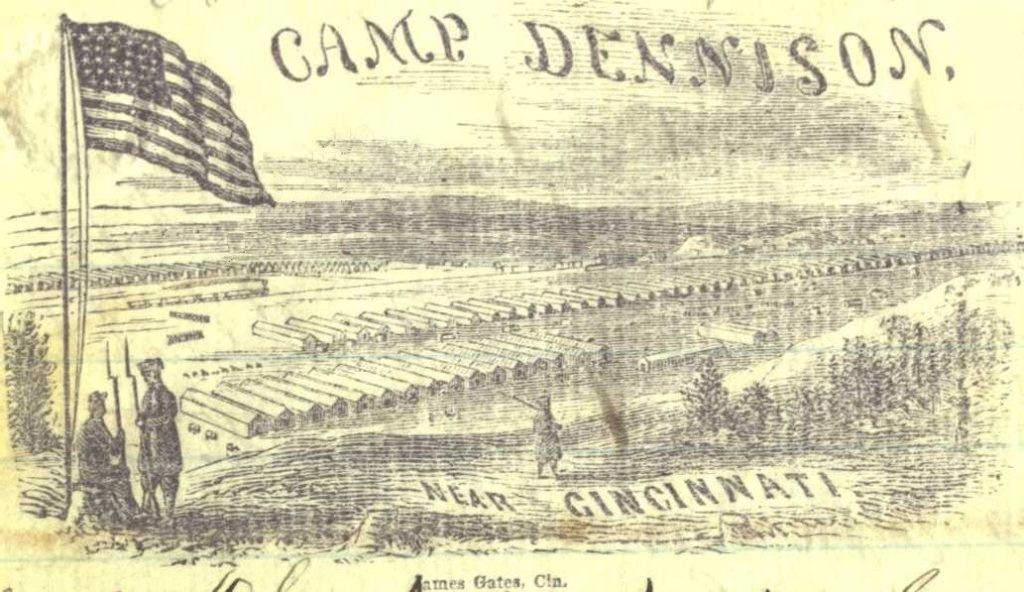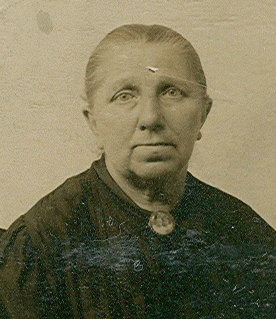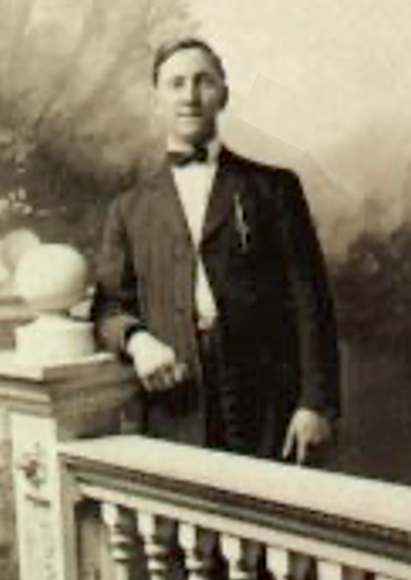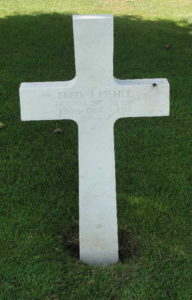Adrian Riehle was born September 7, 1840 in Wagshurst, Baden, the son of Benedict Riehle (1799–1847) and Theresia Ell (1806–1849). We have little information about his early years but the Karlsruhe Archives show him emigrating from Wagshurts in 1857. This is about the time his first cousin, Clemens Riehle, arrived in Cincinnati from upstate New York, with other relatives in the area and especially in southeastern Indiana, so it is likely he had kept in touch with family members who had preceded him.
While we don’t know for certain if Adrian immediately settled in Cincinnati, we do know that on September 9, 1861 he enlisted in the Union Army there, serving until being discharged July 15, 1865. He initially served in Company E of the 4th Ohio Cavalry (aka “Ohio Volunteer Cavalry” or “OVC“) and eventually rose to the rank of Sargent.

site for the 4th Ohio Cavalry. This drawing on military notepaper was
said by veterans to have been an accurate depiction of the camp
(Wikipedia) (Location – Google Maps)
By early 1862 the OVC was in Kentucky (see timeline references for OVC). They occupied Nashville by February 23 and continued to campaign in Tennessee and Alabama through late August, when they began to moved north toward Kentucky to confront Confederate General Braxton Bragg who was campaigning there to “liberate” that state from Union occupation. On October 8, 1862 at the Battle of Perryville Bragg won a limited tactical victory, but realizing that his initiative might not be sustainable, Bragg began a withdrawal for which he would be widely criticized in the South.
No longer needed as part of Bragg’s forces, General John Morgan (of “Morgan’s Raiders” fame) was detached to make his way back to Tennessee. He immediately moved into nearby Lexington, “defeating and capturing there the Federal garrison and a regiment of cavalry” (see link, p.36). Adrian Riehle was captured as part of that cavalry regiment on October 18, 1862.
Morgan was on the move and so he paroled his prisoners immediately. Parole was a common occurrence during this part of the war whereby the paroled men would be honored-bound to forego participation in further fighting against the captor’s forces until the end of the war or a prisoner exchange (often just a negotiated exchange of specified parolees). But parole was not a free ride home. Soldiers were kept in confinement by their own army at a parole camp, which could rival conditions of a PoW camp. Union Parolees from this theater of the war were typical sent to Camp Chase near Columbus Ohio, but the OVC quickly moved back into Tennessee after the mid-October fighting and it is possible a parole camp was established there. To our knowledge, Adrian never participated in any subsequent fighting, although he remained attached to the Union Army until the end of the war. We know that in January 1864 while located at Pulaski, TN, he was “discharged” and “reenlisted”, presumably into a different unit, perhaps as a consequence of his parole status. In November 1864 he is reported to have been promoted to Sargent. Pulaski, TN is south of Nashville, where he was mustered out after the war ended so we have no record of him being assigned anywhere other than central Tennessee between the time of his capture in October 1862 and his release from the army in July 1865.
Apparently while held in confinement, Adrian developed the conditions that eventually led to severe chronic pain, disability and mental collapse. He suffered from severe catarrh (inflammation of a mucous membrane) and he had debilitating bouts of rheumatism. Over the years the effects of these conditions became too much to bear and by 1887 he applied for status as an invalid due to his war-related issues. On May 5, 1890 Adrian was admitted to the U.S. National Home for Disabled Volunteer Soldiers in Dayton, Ohio. Under “Kind and Degree of Disability”, records indicate “Catarrh / Mind impaired”. On December 30, 1890 he was transferred to the Government Hospital for the Insane in Washington, DC where he remained until his death.

Braun Riehle
Despite his ordeals, Adrian was able to marry and raise a family. While we do not have a precise date, sometime between his discharge from the Army in 1865 and presumably before the birth of their first child in 1870, Adrian married Dorthea (Dora) Braun. Dora was born in Bavaria in 1848 and according to census information, emigrated to the US with her family in 1850. She and Adrian had eight children with five sons and a daughter surviving infancy.
Adrian died on July 19, 1905 in Washington DC and was buried at St. Mary’s German Cemetery in Cincinnati Ohio. Dora died March 25, 1913 and was also buried at St. Mary’s Cemetery.
We obviously lack reliable information on Adrian’s status and location between his capture at Lexington in October 1862 and his release from the army in July 1865. Research is ongoing but any additional information would be appreciated.


Meuse-Argonne American Cemetery
Near the battlefield, Lorraine, France
(Click to enlarge
Fred J. Riehle
As if this family had not suffer enough anguish, Adrian and Dora’s son Fred Riehle followed in his father’s footsteps, serving with the US Army in France during the First World War. He was born on March 30, 1888 near Cincinnati and entered the army on May 28, 1918. He was assigned to the American Expeditionary Forces in France on August 18, 1918 and was killed in action on October 4, 1918 at the start of the second phase of the Battle of Meuse-Argonne, just as his 32nd Division was brought into the battle. This major American operation was among the final of the war with his death coming just over a month before the November 11 armistice.
Riehle Genealogy:
Adrian Edward Riehle (1840-1905) – WikiTree
Benedict Riehle (1799-1847) – WikiTree
Johannes Riehle (1756-1828) – WikiTree
Bartholomäus (1732-1798) – WikiTree
Mathias Riehle (1698-1748) – WikiTree
Johannes Riehle (1674-1755) – WikiTree
Markus Riehle (1650-1732) – WikiTree
Johannes Riehle (1630-1674) (Unverified – WikiTree TBD)
See More detail about Adrian Riehle’s Military service
We would like to thank Carolyn J. Burns, a contributor to Ancestry.com, for her research into the life of Adrian Riehle and her contributions to this article.
The photo of Fred Riehle was contributed by Jay Riehle. Photo of his grave sourced from
Global, Find A Grave Index for Burials at Sea and other
Select Burial Locations

Register as a Riehle.Net User
If you would like to register with us, please leave a confidential comment below, ideally with some information on your Riehle family lineage or whatever you want us to know about you.
No span; terminate at any time.

Share this page with family on
social media

Thank you for this information. Adrian was my great grandfather. My sister and I have researched back to Markus. But we’re unable to confirm his parents. This is a wonderful resource/information page. The ancestry bug has bit me and to find out information like this truly makes me feel small and large at the same time!